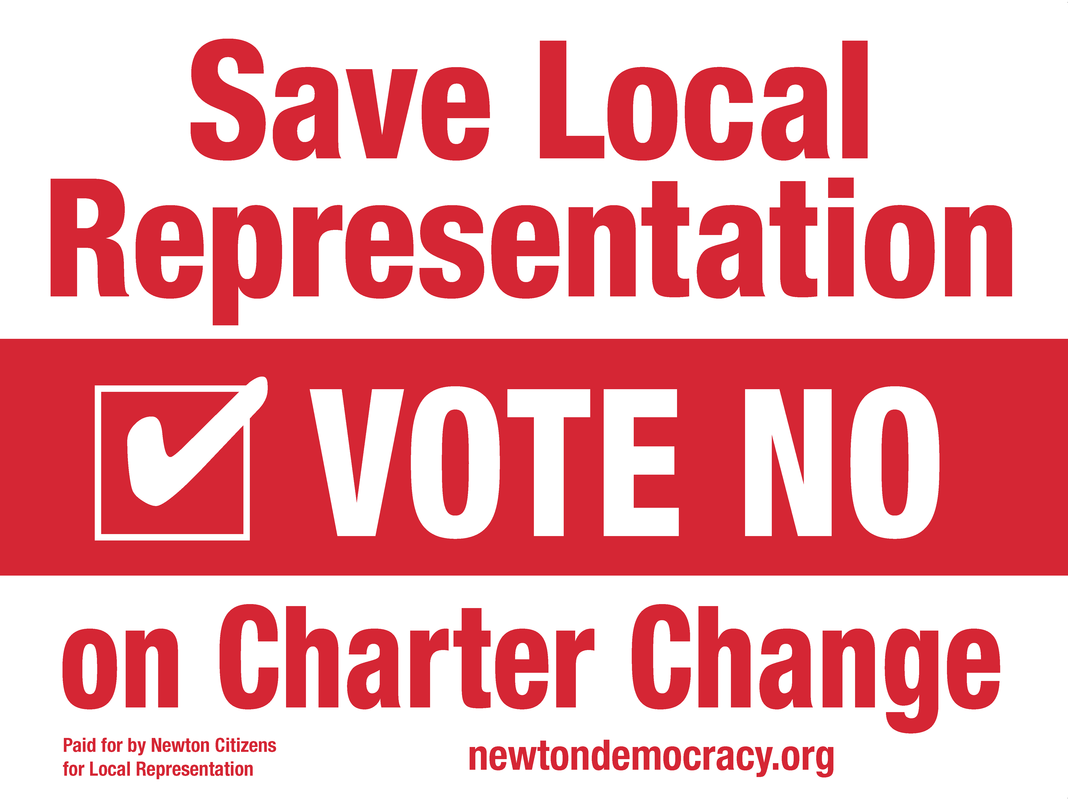|
By Nancy Tener (Letter to Newton Tab)
On Tuesday Nov. 7 Newton voted down the proposed Charter by a margin of 2,000 votes. 12,519 Newton voters decided they did not want to lose local ward representation—soundly rejecting the Charter Commission’s proposal to elect all city councilors at large. In fact, more people voted NO on the Charter than voted for Mayor-elect Fuller. Over the summer and fall, I knocked on over 500 doors in Newton to educate voters about the Charter proposal and to make the case that Newton would be changed in ways we would regret forever if it went forward. Loud and clear was voter rejection of the at large council model at the ballot box. Voters do not want to lose their local voice. In my canvassing, some voters did say that they would favor a smaller council. That comes as no surprise. In 2000, in a non-binding referendum, Newton voters supported reducing the size of the Council two to one. On Wednesday night, the Council began to discuss a home rule petition that would preserve local representation and also reduce the size of the council—an opportunity to follow the direction voters set on Tuesday. It proposes a Council with eight locally elected ward representatives and eight elected at-large with a residency requirement. It is referred to as the “eight and eight” proposal. This plan provides a way to satisfy voters’ desire for local representation and a smaller council. This model was favored by the League of Women Voters when they studied the issue in 1989 and continued to be the position of the LWV until 2010. To my surprise, the Charter Commission showed up at City Hall in full force on Wednesday night to argue again for removing local representation. Speakers who had been in favor of the proposed charter argued that voters did not know what they were doing on Tuesday and that they did not understand the ballot. Essentially their argument is that the voters cannot be trusted. This cynicism can only weaken our city and undermine democracy. Across the country, citizens are coming together to reinvigorate the electorate by making it easier to participate in public discourse and removing barriers to speaking through the ballot box. A group of people with a lot of money here in Newton is pushing hard to muffle local voices and to shrink accountability. That will move us in the opposite direction. Voters said NO. There is another hearing on the eight and eight proposal at City Hall on Nov. 15 and a meeting of the entire Council on Dec. 4 to consider this proposal. I hope voters will come to City Hall to listen to the debate and will contact your Councilors to express support. The 8 and 8 proposal has been studied. The voters have spoken. It’s time for the Council to act by supporting the eight and eight proposal. Elections have consequences. Nancy Tener
2 Comments
By Barbara Darnell (Letter to Newton Tab)
Last Tuesday, Newton voters overwhelmingly voted against the proposed changes to Newton’s Charter, thus preserving our local ward councilors. On Wednesday, the Home Rule petition to reduce the size of Newton’s City Council to 16 members (eight at-large from each Ward and eight ward-only) was brought before the Programs and Services committee. This petition had been submitted in September on behalf of 14 councilors: Brousal-Glaser, Blasar, Ciccone, Cote, Danberg, Harney, Kalis, Lappin, Laredo, Norton, Rice, Sangiolo and Schwartz. As someone who opposed the proposed Charter due to the elimination of ward councilors, but nonetheless would prefer a smaller Board, I strongly support the 8+8 petition. It would reduce the size of the Council while preserving ward representation — a solution preferred by my friends and neighbors, as well as the hundreds of citizens that I heard from through the “Citizens for Local Representation” campaign. I sincerely hope that the Programs and Services committee will vote the petition out of committee on Nov. 15 and allow the whole Council to consider it on Dec. 4. And I urge the MANY of you that prefer a smaller Council with local representation to let our representatives know just how you feel: call, write and email them. Let your voice be heard. Again. Barbara Darnell, Lake Avenue 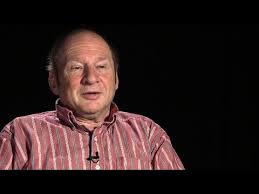 I’ve read the literature and spoken to advocates of the charter change. What I've observed is they focus on the benefits of reducing the size of the City Council -- it would make things more manageable and remove awkwardness. But with those good intentions, another awkwardness is being removed -- the “awkwardness" of local accountability. The "awkwardness" of having ward councilors who are accountable to their ward. Currently, each voter has 33% of their city council representation directly accountable to their ward, that is having the ward as their constituency. The proposal would change that 33% to 0%, eliminating local accountability. So, when I hear proponents argue in favor of the charter change, it's all about reducing council size; killing local accountability is rarely mentioned. It is as if it is just collateral damage. There is one place this is discussed -- in the introduction to the charter commission report where they discuss the idea of "Ward-based councilors" -- should they be elected by ward or by city-wide? They write: “A potential drawback of predominantly ward-elected bodies is that the councilors have incentive to put parochial problems before citywide concerns”. Note the language of that sentence, and what a tremendously biased characterization it is. The "drawback" is what some people might call local accountability. The remedy to "predominantly ward-elected" is to eliminate any ward election at all. Local issues are “parochial problems” while citywide issues are “citywide concerns?” The report goes on: “We concluded that Newton would be best served if ward-based councilors were accountable to all voters.” This sounds nice, but in other words: “We concluded that Newton would be best served if no ward-based councilor was accountable to the ward.” What it ignores is that there ARE issues where there can be a conflict between overall city perspectives with local perspectives and where governance needs to find a balance. One of the obvious issues is development and development involves a lot of money, and a lot of opportunity for outside interests to apply pressure. At same time, all the councilors will be forced to run citywide campaigns, which are more expensive and makes candidate more susceptible to pressure. The normal way to deal with that is to have a balance of councilors; some whom are accountable locally and some more globally. What we see happening now, is that the charter change advocates are trying to minimize concerns about local accountability. And they are conflating the issue of council size with the issue of council accountability and we need to keep the light focused on accountability. The fact is, if Newton misses the opportunity to shrink the council size this election, people can always raise it again next year. But once we kill off local accountability, it's gone forever. Hal Abelson 126 Sumner St Hal a 34-year Newton resident and the Class of 1922 Professor of Computer Science and Engineering in the Department of Electrical Engineering and Computer Science at MIT. He is a founding director of both Creative Commons and the Free Software Foundation. He helped create Logo for the Apple II in 1981 and co-wrote MIT's introductory computer science text book, The Structure and Interpretation of Computer Programs. Hal also spearheaded the MIT OpenCourseWare project and is a former director of the Center of Democracy and Technology. Dear Friends, I ask you to join me in saying “NO” to the changes proposed to the city’s charter that will be on the ballot this Tuesday, November 7th. A summary of the changes and the pro- and con- arguments are summarized concisely at the very bottom of the Newton election page. Here’s my biggest concern: the charter proposal forces us to choose either “yes” or “no” on a “package” of changes that includes the loss of ward-elected councilors. While I agree wholeheartedly with two of the proposed changes—smaller council size and term limits—eliminating all ward-only councilor seats is a poison pill to democracy that we cannot stomach. Here are three reasons why: 1. The loss of ward-only elected councilors robs Newton citizens of local voice, equal representation and the ability to hold locally-elected officials accountable. City government should balance both city-wide as well as ward-specific needs, which sometimes conflict. Under the proposed charter, all seats are elected at-large and nearly half of the council—up to 5 members of the proposed 12 seats—could reside in the same small section of Newton, depriving people in other sections of representation and removing checks and balances. This structure is unusual: 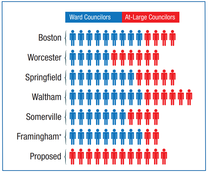 Charter proponents argue that eight of the seats have a residency requirement. But residency is not representation. “Eliminating the by-the-ward, for-the-ward aspect of local representation should be something that concerns residents, no matter where they stand on any number of issues,” said the Newton Tab as it endorsed the “NO” vote.
Today’s village/ward structure does not line up neatly. But practically speaking, our day-to-day lives tend to concentrate around a few villages, each connected to a few wards. In a bustling city of 87,000, the villages provide a smaller-scale touch-point for people to engage and take care of their community. I believe that this dynamic is Newton's special sauce and that it will be lost under the new charter. 2. The proposed charter will make it much harder for everyday people to be elected to city council. Ward-only campaigns typically cost $8,000. With only four precincts to canvass, candidates can knock on every door over a period of months. Under the proposed charter, all candidates are elected city-wide, even those who live in the ward. They must raise nearly four times the money and knock on more than 30,000 doors. Who has this kind of time and resources? This is unfair to the average citizen and doesn’t feel like democracy. 3. You can vote “No” and still reduce council size from 24 to 16 seats. City councilors have been listening to the lively debate. As a result, 14 councilors have initiated the process to reduce the council to 8 ward-only seats and 8 at-large seats under Home Rule petition if the “No” vote prevails. Why care? It’s School House Rock. Citizen voice and accountability of elected officials are the building blocks of democracy. Please know this: Had the charter commission put forward a proposal that focused solely on a smaller council size with term limits, I would have gladly joined my friends on the “yes” side. But we were not given that choice. For reasons I explain above, I hope you will join me in voting “NO” on Tuesday. Want to know more? Jack Prior, my husband, has been researching the issue exhaustively and participated in live debates. Click here for his debate speech and here to watch the full debate. Thanks for listening, Lisa Prior By Brenda M. Cotter
After much consideration and conversations with many people on both sides of this issue, I am voting no on the proposed changes to the Newton charter. I very much appreciate the work of the Charter Commission and support many aspects of the proposal, including reducing council size and imposing term limits, but I think eliminating ward representation is a serious mistake. Under our present system, there are 24 councilors, 16 of whom are elected “at-large” (but with residency requirements in each of the 8 wards) and 8 of whom are elected from within and by each of the city’s 8 wards. The new charter proposes 12 councilors, all of whom are at-large (but with ward residency requirements for 8 of them). I oppose this change for these reasons. 1. Contrary to some of the campaign materials you may have seen, the new charter does not “retain” or “maintain” ward representation, it eliminates it. A ward residency requirement is not the same as, and is not equal to, ward representation. To put that most starkly, someone living in a ward could be defeated by their own ward voters but elected “at-large.” 2. Each ward of the city of Newton has its own demographics and character. I have requested purely ward based demographic data from each side of the campaign, but neither has been able to locate such data, nor have I. Even without it, though, it is not to hard to observe, even by visiting elementary schools throughout the city, that different parts of the city have different demographics. My biggest concern is that eliminating ward representatives on the council could have the effect of diminishing or impairing minority voices, whether those minorities are racial, ethnic, or economic, as well as the voices of newcomers to city politics. 3. On that point, it is worth noting that there has been a very substantial amount of litigation under the Voting Rights Act based on the claim that “at-large” versus “district” elections impairs minority representation. I am not saying that Newton would be subject to that claim as Newton is, indeed, more homogenous than other cities that have been sued. But it is important to understand that utilizing “at-large” systems versus ward or district systems, has, in some contexts, had the effect of suppressing minority voices and participation. 4. I am concerned that the requirement that every councilor mount a city wide campaign might discourage or impair those people who do not have the money, time, or political connections required to mount such a campaign. I note that the yes vote proponents argue that it is not more expensive to mount a city wide campaign citing some spending data from various city and ward-based races. I have no doubt that some people may have spent more on local races (although intuitively, bigger campaigns will cost more) but it is the other factors that concern me even more. It may be much easier to mount a citywide campaign for those that are already well connected to politics in Newton. There is absolutely nothing wrong with being a political insider. Indeed, these are the folks that often drive the most important changes that affect our lives. But I don’t want to see our local government limited to insiders or those connected to insiders. Having ward elections mitigates that potential harm. 5. Finally, representative government is how both our federal and state system work. We don’t elect every representative or senator in either system. The reason for this is to give and reserve power to local voices. I don’t see a good reason to vary from that at the city level. Make no mistake: there are great people who care deeply about this city on both sides of this issue. And the Charter Commission worked hard, motivated by a vision for a better government. For that reason, it has been important for me to listen carefully and learn as much as I can before casting a vote. Based on that, I must vote no. See today's Boston Globe article on the proposed changes to Newton's constitution (the charter) and the special interest financing behind the campaign to get it approved.
By Howard Frandt
Does Newton have too many city councilors? Yes, but not because twenty-four is such a big number. The debate about council size has missed the main point, and needs to shift perspective. From the perspective of accountability, the Charter Commission proposal is only a slight improvement, not enough to be worth the costs of giving up ward representation. The “Plan B” proposed by some councilors actually goes further in the right direction, though not all the way. Voters should vote no on charter revision. Accountability Newton’s City Council has twenty-for councilors: eight elected at large, another eight who are from particular wards but are elected at large, and one elected from each of the eight wards. This creates problems, but the main problem is not in the Council chambers. It’s in the voting booth, Look at it from the perspective of a voter. For accountability to work, voters need to be able to make informed decisions about the people they’re voting for. But in Newton, that means each voter needs to know about the positions and actions of seventeen different people (eight at large plus eight citywide by ward plus one by ward), plus the people running against them. That’s an unreasonable expectation. Quick: How many of your seventeen councilors can you name? Contrast that to the U.S. Congress. Congress has 535 voting members, but citizens only need to make decisions about three of them, two senators and a representative. There are cities that have larger councils than Newton (larger cities, to be sure), but is there another city in the U.S. where voters have to make judgments about candidates for seventeen slots? So our focus should be on reducing the number of councilors that each citizen has to hold accountable. The Commission proposal gets off to a good start by cutting the number of at-large councilors in half, from eight to four. Then the reasonable thing would be to get rid of the strange institution of the at-large ward councilor. That would leave us with a council of twelve, and each voter would have to make an informed decision about five councilors- -four at-large and one by ward. That’s a much more manageable problem. Inexplicably, the Commission is proposing instead to keep the city-wide councilors and get rid of the ward councilors. So instead of five councilors, every voter will have twelve to hold accountable. Good luck. Some of the councilors have proposed what they call Plan B, which first requires defeat of the Commission proposal. Under this plan, the city would keep eight at-large and eight ward councilors. At first glance this might seem to be a step backward from the Commission proposal, as it implies a council of sixteen rather than twelve. But paradoxically, it means that voters have to keep track of fewer councilors: nine instead of twelve, a reduction of almost half from the original seventeen. On this ground alone, Plan B is better—and that’s before we consider the costs of giving up ward representation. Fair Representation The public discussion of the pros and cons of ward representation has shied away from what is generally considered one of the most important issues in neighborhood vs. at-large representation: fair representation of minorities. If there is a minority that tends to live in one neighborhood, an effective way to reduce their representation is to elect all councilors at large; then they are a numerical minority in every contest and may end up with no representation. That has been the basis for recent civil-rights lawsuits across the country, from Santa Clara, California to Lowell, Mass. Newton does not have racial minorities that live in distinct neighborhoods. But it does have an ethnic and socioeconomic minority: the working-class families of mostly Italian and Irish ancestry that have lived in Newton for generations. Those families are entitled to a seat at the table when the city council meets. But they are less likely to get one under the Charter Commission’s plan; every one of the twelve councilors might end up reflecting the views of the upper-middle-class majority. I don’t think for a minute that this was the intention of the Charter Commission, but that is the effect. The tilt toward upper-middle-class voters is strengthened by the fact that potential first-time candidates would face the daunting, and expensive, prospect of running citywide. The Charter Commission undoubtedly worked hard and made a sincere effort. But their proposal creates more problems than it solves. That’s why I’ll be voting No in November. Howard Frant Howard Frant graduated from Cabot School in Newton and later got a doctorate from the Kennedy School of Government at Harvard. He taught public policy and public administration at the University of Arizona and the University of Haifa. His research focused on the connections between democracy and the structure of public organizations. Watch Marc Laredo's closing argument at the Charter debate on 10/22/2017 at Angier School. Newton TAB Endorses NO vote on Charter (link).
Ward representation has been a critical element of Newton’s political process for 125 years, ensuring the city’s diverse villages each have a voice on matters before City Council. But the Charter Commission’s proposal, to be voted upon Nov. 7, would eliminate the city’s eight ward-elected councilors. A 12-member City Council, elected entirely at large, would be too small, overly centralized and lack the checks and balances provided by ward representation. Newton is a city of villages, each with a distinct personality. Eliminating the by-the-ward, for-the-ward aspect of local representation should be something that concerns residents, no matter where they stand on any number of issues. Because of this flaw alone, the Newton TAB strongly endorses a No vote on the Charter Commission’s proposed package of revisions. Is a 24-member City Council too large, as advocates of the charter reform plan claim? Absolutely it is — which is why voters established the Charter Commission by a landslide in 2015. And other elements of the commission’s plan, specifically the establishment of term limits for mayor and city councilors, do make sense. Gutting the core of Newton’s longstanding system of balanced representation in an attempt to increase City Council efficiency should not, however, be viewed as a “best practice.” A city councilor elected from a ward does not have the same level of accountability as one elected by that ward. Don’t be confused by claims to the contrary, or by the language on the ballot. An at-large councilor may choose to be responsible for dealing with the issues, both big and small, that occur on a regular basis in our neighborhoods. But there is no political compulsion to do so. On the other hand, councilors elected by ward residents, if unresponsive to their constituents’ needs, may face a challenge and perhaps be defeated in a bid for reelection. In other words, the ward councilor system provides built-in accountability for neighborhood representation and good local governance. At-large representation is important in its own right, but city interests and more local interests sometimes can conflict. Moreover, the position of ward councilor makes running for City Councilor much more accessible to many candidates, especially those who lack sufficient time and/or money to campaign across Newton’s 18-plus square miles. Running for a ward seat on City Council is much less expensive and time-consuming because a candidate need only reach voters in his or her ward, four precincts instead of 32. It’s also important to realize when you vote in less than two weeks that most members of City Council have finally recognized what residents have been saying for years: 24 members is too many. If the charter question is rejected Nov. 7, the City Council’s Programs & Services Committee will one night later begin deliberating a plan to reduce membership by a third, through a Home Rule Petition plan that would eventually return to voters for approval. Importantly, this plan retains all eight ward council positions, along with eight that would be elected citywide. On Nov. 7, Election Day 2017, vote No on the Charter Commission’s plan. By doing so you will vote to protect ward representation — which creates the balance between village and citywide interests. Our 13 villages are what make us unique. They deserve a level playing field. What can the viral video of the cute three-year-old's plaintive pleas tell us about how we should vote on the Newton Charter Commission's proposal? The need to be heard, understood, reckoned with, acknowledged is a deep and early human attribute– and it is imperiled by the Charter Commission's proposal. The maneuver to eliminate the ward-only Councilor is a bold maneuver AWAY FROM the responsiveness and direct personal relationship we expect and need from those who are there to REPRESENT us.
The Newton Charter Commission took a potentially valid problem (too many councilors– either for pensions and payroll, or for consensus- and decision-management: i. e. the problem of "herding cats"), deliberated – and came up with exactly the wrong solution. Currently, TWO "at-large-" and ONE "ward-only-" -voted representatives come from each district. Rather than perform the obvious reductive surgery of halving the doubled at-large-councilors and keeping the only ward-only-, the commission did the opposite: eliminating all locally voted reps. A quick look at Newton’s history gives perspective of how this situation arose, as well as insight to its solution. Originally, Newton had a bicameral representation system, consisting of the Board of Aldermen’s body of ONE at-large member from each ward -- AND the separate Common Council’s chamber of TWO locally-voted councilors/ward. Bills had to pass each of these separate houses. In 1897, Newton's new charter merged these two houses and FLIPPED the ratio representation to its current configuration of two At-Large and one "local" Councilor from each ward. The original system could be seen as analogous to our federal and state systems of senators and representatives, with (in both cases) senators' being less locally attuned and responsive. That representatives are elected every two years and senators every six years acknowledges the people's need for closer attenuation and greater attention to their needs in a representative democracy. Senators tend to look more at the "big picture", but constituents get a closer and quicker hearing from those most responsive to their votes – their local "at-small" rather than “at-large” representative. So why did the Charter Commission eliminate the local rather than one of the two at-large councilors? Eliminating representatives with greater ties to their local area is the obvious answer. As former Aldermen Marcia Johnson wrote a year ago: "It’s not a people problem, it is a structural problem. (From) taxation to spending to land use regulation, ward-only councilors simply cannot be held accountable for their actions by people from the other seven wards… they are only accountable to one-eighth of the electorate." Oh, by the way, that "one-eighth of the electorate" -- that's YOU(!), ...when you happen not to agree with THEM. The inferred purpose, then, is to have everybody be able to be more beholden to some presumed "greater political will". Please, keep in mind, that the first change of Newton's elective representation system went in exactly the same direction, quadrupling the erstwhile city-wide- versus local- Alderman-ratio. So, in a system that was already rejiggered to subsume the local will to the general, the current change – rather than to deal with the "listen to me" voters' needs – just eliminates these most responsive local representatives. Oftentimes, our government is mistaken to be solely a democracy – when, in actuality, it is a republic. The distinction is that a pure democracy can breed a so-called "tyranny of the majority", wherein the rights and interests of some can be contravened, eliminated, and ignored by those of others whose opinions happen to align with a majority – or even worse happen to align with certain empowered interests who are able to convince merely a majority of representatives. The essence of a republic is to maintain ideas, rights and interests balanced across a wider spectrum – to act as ballast for continuity, bulwark against peremptory (and possibly attractive but often facile) "big ideas". Our system differs from a parliamentary, and is more nearly immune to citizens’ being steamrolled. The Charter Commission, in the interest of restraint and responsiveness, could have and should have eliminated the "extra" / duplicated at-large representative and maintained the locally responsible one. Their not having done so validly speaks to their motives and our need to reject their proposal. Vote “NO”. Randall Block Newtonville PS: Legislation that would “correctly” reduce the size of the Newton City Council has been filed: eliminating half the at-large councilors – leaving 8 ward, and 8 at-large. Counselor Emily Norton believes “16 is large enough to avoid group-think yet still allow for a diversity of opinion (and avoid power-centralization)’. See commentary from Ward Councilors John Rice and Emily Norton in this week's Newton Tab.
"Ward Councilors bring the concerns of individuals to City Hall and advocate for them, so the ward councilor is typically the first person residents call when they run into a municipal roadblock" Andrew Martin, Newton Centre
In the overwhelming majority of Massachusetts communities with city councils, the councils consist of both ward and at-large councilors. In only 10 of the 351 communities in the state – under 3 percent – are there councils consisting entirely of at-large councilors; in less than a handful are there councils consisting entirely of ward councilors. This reflects a clear consensus across the state that the combination of ward and at-large councilors assures that both community-wide and neighborhood perspectives enter into council deliberations. Councils consisting only of ward councilors are vulnerable to blockage of policies that might have been deemed beneficial to the city as whole by a majority of at-large and minority of ward councilors. Similarly, councils consisting only of at-large councilors are vulnerable to imposition of policies that might have been deemed damaging to neighborhoods by a majority of ward and minority of at-large councilors. In contrast, a mix of ward and at-large councilors encourages shifting coalitions across both likely to balance city-wide and ward concerns in positive-sum solutions. It also limits the ability of particular groups and interests concentrated in sections of the communities to dominate the legislative process. Constitutional provisions such as those structuring representation don't guarantee any political outcomes. They only influence the likelihood of some outcomes more than others, while leaving scope for political action in diverse directions. The proposal for an exclusively at-large council in Newton leaves too much scope for political action that results in unequal representation and enables powerful interests to impose costs on neighborhoods that lack representation. A vote against the proposal makes that less likely by preserving the mix of ward and at-large councilors overwhelmingly prevalent in Massachusetts. It does so, at worst, by preserving the current 24 member council or, at best, by opening the way for the establishment of an 8 ward and 8 at-large council. This could be accomplished through a Home Rule Petition to which a majority of the present Council is already committed. See the chart below for a comparison of the all at-large council proposed for Newton with a sample of councils in Massachusetts cities of varying size. When I hear the argument that the Charter Commission's proposal for a new structure for Newton's City Council would make us more "efficient", I encourage us to think more deeply about that. I don't think we want democracy to be too efficient. Dictatorships are efficient.
With 24 councilors we do not suffer from groupthink, where people feel pressured to go along with the popular opinion. With 24 people we have a diversity of opinion, which helps lead to better decisionmaking. With 24 people there are many entry points for a citizen to contact his or her elected officials. I will also note that the decisions that take longer to be voted in are those that are more contentious, and that’s a good thing – it means we really wrestled with it. I will give 2 examples. It took seven years for us to place additional restrictions on the use of leafblowers. Why? Because there are very strong opinions on both sides around the city, and so when it was first brought up, there was not the support for additional restrictions, but over time support grew for them, enough so that last spring we did vote to shorten the season they could be used, decrease the allowed decibel level, and so on. No one can claim we did not hear their opinion on it, or that we didn’t consider all sides of the issue. That doesn’t mean everyone is happy with the outcome of course, but we did act. I will contrast that with our vote to pass a “Welcoming City” ordinance. There was strong and vocal support from many many citizens, including many that were reaching out to their city councilors for the first time ever. As there was much more consensus among residents and councilors that we act, that ordinance was voted in relatively quickly over the course of a few months, with adjustments, such as giving the police chief the discretion to act when public safety at risk, that enabled nearly all involved to support it. I will give one last example for your consideration. I was one of three councilors who filed legislation to put limitations on the use of drones, at the request of several constituents who were concerned about privacy and safety from improper use. The draft bill was sent to the Public Safety Committee where it was discussed several times over the course of several months. During that time it was covered in the Tab and I also wrote about it in my newsletter, but it wasn’t until well into the process that I was contacted by a constituent who had only recently heard about it, and he was very opposed and wanted to discuss it with me. I said of course. He asked if he could bring some drones to my house for me to see in action. I said of course. It turns out this constituent leads a Newton North High School drone enthusiast club. So he brings several drones over to my house and flies them around my front yard. When I saw how excited my three boys were to see the drones in action, and as the constituent told me about how much students learn about engineering and mechanics from the drones, I began to see the “positive” side of them, i.e. have a fuller picture of them. Then I listened as this individual told me about the existing federal law already governing drones, and other data points I hadn’t heard even in all our prior Committee meeting discussions, I actually ended up changing my mind and voting against this legislation that I had filed! (That is not a common occurrence.) My point is that if we had moved more “efficiently”, we would have taken a vote before I had all the information I needed to make a fully informed decision, simply because it takes time for citizens to learn what we are doing – not everyone reads the Tab, not everyone attends our meetings, etc. It is a good thing that the governing body does not move at lightning speed. It allows us to be deliberative, to hear input from our thousands of citizens, to read letters in the Tab, and simply to mull things over. Having said all that, do I think we absolutely have to have 24 councilors? While I do see the benefit, I have also heard from many citizens that would like to see a smaller body. For that reason 14 councilors, including myself, have filed legislation that would reduce the size of the City Council but do it in a different way – we would eliminate 8 at-large councilors which would leave us as a body of 16 councilors – 8 ward, and 8 at-large. I think 16 is large enough to avoid group think and still allow for a diversity of opinion and the other benefits I laid out above. But I don’t think it would make us more “efficient” - and that’s a good thing! If you have followup questions I am happy to do my best to answer them. Best, Emily Norton By Martina Jackson
On November 7th I will vote NO on the Charter Commission’s proposal to restructure the Newton City Council. In eliminating our eight locally elected council members, the commission has removed our local voice. Their argument that the new model is more democratic because everyone votes for everybody is disingenuous: expedient, but not democratic. In the commission’s model, a ward may vote for a candidate who is defeated by the vote of the rest of the city. Moreover, with four candidates running without any residency requirement, at least 4 wards will have only one resident councilor while others may have several, or possibly, one may have as many as 5. The Commission is an example of that inequity: Ward 2 had four members; Ward 5, 2 –both from Waban- and Wards 3,4, and 6 had one each. There were no commission members from Wards 1,7, and 8: nearly 40% of the city was not represented. Clearly, the commission wants a dissent-free council, with members elected in slates. The Newton League of Women Voters is leading the “Yes” charge and pressuring candidates to endorse their position. “Yes” slates are emerging. As an example of the “Yes” campaign’s unwillingness to compromise, when Commissioner Jane Frantz proposed the modest adjustment of replacing the 4 non-residency seats with 4 at-large district seats and the commission voted 5 to 4 in favor, the “Yes” proponents at the hearing vociferously objected and stormed out of the Council chamber followed by Commission vice-chair Rhanna Kidwell. At its next meeting, the commission reversed itself. In the proposed council model, money and special interests will determine successful candidates. Candidates of limited means could not afford to run citywide without likely special interest backing. The last council member to run at-large in a contested race spent more than $30,000 to achieve his victory. Successful candidates will need an agenda acceptable to a well-financed slate or have considerable personal financial resources. As a longtime community activist and proponent of affordable housing – I supported the Austin Street project in my neighborhood and Engine 6 – I want Newton to attract an economically diverse population and I will continue to advocate for more affordable housing. But, that goal is achievable without sacrificing our local vote or by replacing our democratically elected council with a meritocracy. Martina Jackson 115 Lowell Avenue, Newtonville 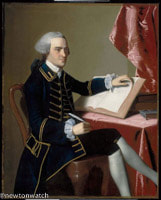 Under the proposed charter, there is no guarantee -- not even any incentive -- for a Ward Councilor elected primarily by others to be representative of the wishes of the voters in the Ward in which the Councilor happens to reside. Residency doesn't imply representation. An imperfect but illustrative analogy: Lt. General Thomas Gage and John Hancock were each Governors of Massachusetts -- each were required to reside in the colony. But what a difference! The former was selected externally (appointed by the Crown) while the latter was elected locally. The analogy is imperfect because these were executives, not legislators -- and being appointed by the Crown is not the same as being elected primarily by voters in other Wards of the city. But we can still learn from the comparison. Internally-selected Hancock was representative of the colony's residents, and externally-selected Gage was not. Bruce Henderson 52 Vaughn Ave The Charter Commission proposal eliminates the 8 ward-elected councilors who provide us with village-level constituent service and advocacy. This is not a system that retains ward representation. If this change passes, no ward will have a councilor directly focused on, and accountable to, its residents. Vote NO on Nov. 7th. The current city charter is very clear with regard to defining "representation" in the context of filling of council vacancies. Councilors at large represent and are elected by, the voters of the whole city while THE VOTERS ENTITLED TO SUCH REPRESENTATION elect the ward councilors. 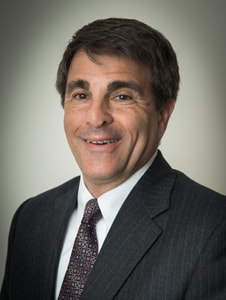 Newton Tab Commentary, 10/18/2017 Newton voters will face a stark choice this November — do we want to replace our current system of equal representation on our City Council with one that reduces diversity of opinion, is inherently unequal, limits accountability, and is more likely to lead to special interests dominating our city government? The answer to that question is NO, and I ask that you join me in voting against the proposed charter on Nov. 7. The proposed city charter will result in a less effective, less accountable, and less responsive city government. First, the proposal limits diversity of opinion and is inherently unequal. Currently, membership on the City Council is allocated evenly throughout the city (divided between councilors elected citywide and those elected solely by each ward). This allows for an array of voices to be heard on important city issues and fosters positive consensus outcomes. Under the proposed charter, nearly half of the councilors could reside in one small section of the city, increasing the likelihood that narrow perspectives or special interests will dominate Newton’s government. Some argue that since all of the School Committee is elected at-large so should the City Council. As someone who has served on both bodies (and as the former Chair of the School Committee), the answer is easy — they are two different entities with very different purposes and responsibilities. The School Committee is a board of directors whose job is to oversee a single school system. In contrast, the City Council is a legislative body which is supposed to represent the diverse interests of the various parts of the city. The local concerns of residents of Nonantum are different than those of Newton Upper Falls, which, in turn, differ from those in Chestnut Hill. Second, the proposal reduces access and accountability. We currently have eight ward councilors who provide village-level constituent service and advocacy on the Council for residents — the proposed system replaces all of them with four at-large councilors without any ties to any particular area of the city. Under our current system, if you run from a ward, either as a ward councilor or a councilor at-large, you need to be responsive to the residents in your district. Ward councilors are the most directly accountable. If a ward councilor does not return his or her constituents’ telephone calls or ignores their views, he or she may well face an opponent in the next election. At–large councilors have less direct accountability, but still need to be accessible to and representative of those in their wards. The four at-large anywhere candidates with no residency requirements who would be elected under the proposed charter would have no such obligations or accountability. Third, the proposal is anti-democratic. When candidates run only within their ward, they can knock on doors, and the cost of campaigning is moderate. In contrast, citywide races are much more expensive, which by necessity will limit the pool of applicants to those who can self-fund, are able to raise large amounts of money, or have access to established political networks. Moreover, the proposal to have four councilors elected from anywhere in the city (electing those with the top four total votes) will reduce the ability to vote up or down on a particular candidate. Finally, this is not about the size of the City Council. A majority of the City Council has sponsored legislation to reduce the size of the council from 24 to 16. I back this legislation because it reduces the size of the City Council in a manner that preserves equal representation and diversity, allows voters to directly vote for or against a particular candidate, is not anti-democratic, and makes it less likely that special interests will dominate our city government. The Charter Commission chose a system that will create unequal representation, decrease diversity, concentrate power, and increase the influence of special interests. I urge all Newton voters to vote NO on Nov. 7. Marc Laredo is a city councilor. http://newton.wickedlocal.com/news/20171019/laredo-matter-of-equal-representation We will vote NO to the charter commission’s proposal for one significant reason: the election of ward councilors is fully at large rather than by ward/neighborhood. We are disappointed that the League of Women Voters has not provided a balanced pro and con analysis as it does for statewide ballot initiatives. While the commission did hold public hearings, the entire campaign sounds like a “fait accompli” rather than a full debate on the issues.
The November 4 proposal for a council of twelve with all members elected at large eliminates a major check against domination by well-organized city-wide constituencies. Newton’s direct representation from its villages with different needs and priorities has proven every effective and should not be eliminated. The proposed council will concentrate power in people representing city-wide constituencies with only secondary advocacy for their village’s interests. The new council requires only seven councilors to constitute a majority vote. Seven or more candidates representing specific interests, for example developers, could easily be recruited and supported across different wards. Conceivably, five members could be elected from one ward. The proposed council of twelve elected city-wide will NOT create a “more effective and responsive government” given the risk of domination of city-wide constituencies at the expense of specific village needs. Given human nature, it is almost certain that more positive changes will take place in the best represented villages while more negative changes will take place in the underrepresented villages. The charter commission has made a case for some change in Newton’s governing structure. But the combination of reduced size and city-wide voting creates undue risk to the tradition of village governance in Newton. Sincerely, Charles and Katharine Stover 72 Saint Mary’s Street Newton Lower Falls Andrew Martin
Supporters of the proposed charter change from Mayor Warren on down claim it preserves ward representation. This claim is simply false: by eliminating ward-elected councilors and making all councilors elected at-large, the change unambiguously eliminates ward representation. The contrary claim relies on the requirement that each of eight at-large councilors live in the ward for which they are designated as councilors, as at-large councilors are now. But this is not equivalent to, nor a substitute for, election of ward councilors exclusively by ward voters. To pretend otherwise is, at best, to misunderstand the basic logic of representative government or, at worst, disingenuous. Representative government works by the way elected representatives are held accountable: a "representative" elected by a geographically defined electorate – a nation, state, city, or ward -- is accountable to that electorate because it alone can vote that representative out of office. So if the electorate is a whole state, the electorate within a subdivision of the state (e.g., a city) can't hold the representative accountable since it can't vote the representative out of office. And if the electorate is the whole city, the electorate within a city's subdivision (e.g., a ward) can't hold the representative accountable for the same reason. So whether a representative chosen by the voters of a whole jurisdiction lives in a subdivision of that jurisdiction or not makes no difference to the inability of the subdivision voters to vote the representative out of office. That residence isn't what makes a representative accountable is implicitly recognized in the US Constitution. In specifying eligibility for membership in the House of Representatives, Article 1, Section 2, ¶ 2 does not require that House members live in the districts they represent, stating only that "a Representative . . . [shall] be an Inhabitant of that State in which he [sic] shall be chosen." As a practical matter, our members of Congress are expected to live in our districts, as our ward councilors are currently expected to live in our wards. But that isn't what enforces their accountability to us. What does it is the fact that the district and ward electorates, respectively, can vote them out of office. Thus, the charter change requirement that eight of the councilors elected by the whole Newton electorate must live in designated wards in no way enforces the councilors' accountability to those wards' electorates since they are nevertheless deprived of the possibility of voting the councilors out of office. So all the talk about a representative elected by the whole city being a representative of a ward in which the representative lives obscures this fundamental point. The charter change designers' aim of limiting local influence is signaled by the provision that there be no ward residence requirement for 4 of the 12 councilors. This makes it mathematically possible for there to be five councilors living in one ward to be elected, leaving seven to be elected elsewhere so that there will be no councilor living in four wards. While this is not probable, it is probable as well as possible for there to be no councilor living in one or more wards. If residence matters for representation as the designers claim, then they've made representation likely to be unequally distributed among wards, with some wards having none. Ward representation can obviously be kept both real and equal while also achieving the objective of reducing the council's size simply by retaining the ward councilors while eliminating 8 of the current 16 at-large councilors. The charter change supporters haven't provided a clear public explanation why they didn't support that alternative. However, 14 of the Council's current members have proposed exactly that alternative, to be achieved through a Home-Rule petition. That option would become available if, but only if, the proposed revision is rejected in the November election. Voting No on the revision would thereby open up a way to reduce the council's size without sacrificing local representation. If reducing the present at-large:ward ratio of 2:1 to 1:1 is unacceptable, then the only way to preserve real and equal ward representation is to vote No and leave the 24-member Council as is. Either way, a vote against the proposed charter change preserves the local representation inherent in the basic logic of representative government. Andrew Martin 9 Applegarth St. Newton Centre, MA 02459 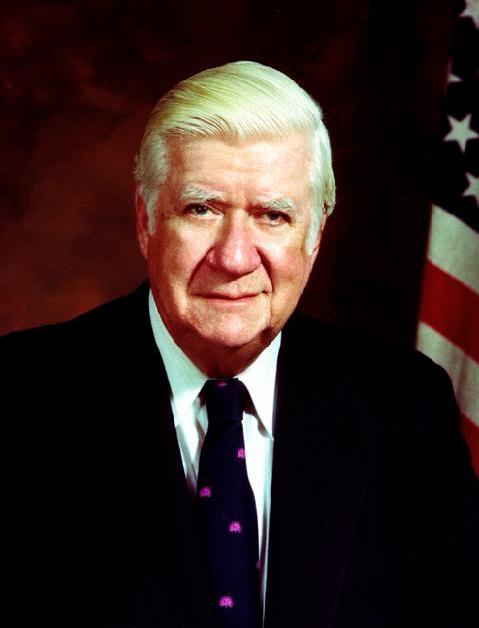 I VALUE MY WARD COUNCILOR! I value my Ward Councilor – and I don’t want to lose him/her! My Ward Councilor is Lisle Baker. He is my first link to City Government. He represents me, my neighbors, my Ward. He is accountable to us. Without our support, he would no longer represent us. . “All politics is local,” said the late Tip O’Neill, U.S. Rep. from Boston and Speaker of the House of Representatives. Local representation has a secure place in our democratic system, and it begins at the Ward level. Newton’s founders recognized this important unit of government, at a time when we had far fewer voters in Newton, and were an agrarian, homogeneous society, not the multi-cultural, multi-ethnic (with a range of household incomes) community that we are today. We often note that each village of Newton has its unique character. This diversity calls for a local level of representation. In Massachusetts, 75% of cities have more Ward Councilors than at-large Councilors. All at-large city councils in Massachusetts have been found to be more homogeneous and less representative of their constituents than those with ward-elected councilors. The Ward Councilor is the first one we call for the smallest of issues - perhaps a traffic light - or on a much larger scale, to preserve a golf course as a public course, or to preserve a historic home and grounds with history back to our Revolution, as is the case with the Durant-Kenrick House and Grounds. Every Ward or village has specific issues – large and small – and the Ward Councilor is our first – and many times, best – facilitator to resolve the issue, or to steer us through City Departments and processes. One criticism of our 24 member Council is that Council meetings are sometimes long, redundant , and a decision seems hard to come by. This is democracy! It is often messy, inefficient, time-consuming, even boring! But different opinions are heard, and one hopes that with give and take, decisions will be made that are reasonably satisfactory to all concerned. Solutions should be the product of a variety of opinions and well-reasoned deliberation, with community input. Neighborhood representation is very important, so that, finally, there might be modification and compromise satisfactory to all sides. Eliminating the Ward Councilor means that a neighborhood might not be adequately represented in such deliberations. Moreover, we must consider the financial impact of being a candidate within the Ward, or as an at-large candidate. It takes a much heftier campaign budget to reach the entire City population than running a campaign within the Ward. Moreover, within the Ward, a candidate can knock on every door and get to know his constituents and their concerns. A Council that is elected only at-large could be skewed toward people with big pockets who do not represent many areas of our City. . A Ward Councilor and two at large Councilors from each Ward give ample opportunity for access, and there are members enough to insure diversity of opinion and skills on the various Committees of the Council. Councilors are part-time, now, but their commitment to the City of Newton and to their constituents is a very time-consuming job. To understand the issues about which they must make decisions often requires research, hearings, Committee meetings. A reduction of the Council from 24 councilors to 12 would mean our Councilors would shoulder much heavier demands. There is a danger that they will be spread too thinly, resulting in much less appreciation and understanding of the issues on which they must vote. It seems to me it would be very difficult for a person to be only a ‘part-time’ Councilor. We would lose diversity as well as the enrichment of opinion and skills from people whose experiences spread across a broad spectrum of business and life. I vote for keeping our eight Ward Councilors, and in addition, two Councilors per ward, elected at-large (24 Councilors in total), a form of government that has worked for Newton for over a century, from the time we were an agrarian, homogeneous society to the multi-cultural and more complex society we are today. Constance G. Kantar 382 Kenrick Street The City of Newton sent out a summary of the charter question on the ballot to all households. You should have received it or will receive it shortly.
The first portion is the summary of the charter change as it will appear on the ballot. This was authored by the charter commission. They declined to include a sentence mentioning the elimination of ward-elected councilors from city government. The 2nd section is an objective summary of the charter changes authored by the city law department. Finally the 3rd and 4th sections lay out the case for and against the charter authored by the Yes and No ballot committees. The summary is available online at the bottom of the elections page on the City website.
Marc Laredo and Martina Jackson faced off against Brooke Lipsett and Tom Sheff on NewTV Common Ground with Ken Parker last week to make the case against the Charter Commission's proposed changes to Newton's constitution (the charter).
See Andy Levin's editorial in this week's Newton Tab.
The Boston Globe featured the Charter Commission Chair Josh Krintzman and Newton Ward Councilor Emily Norton presenting the case for and against the proposed replacement of Newton's Constitution, the city charter. Below is Emily's case against the charter: Emily Norton Newton Ward 2 City Councilor Voters should vote “No” on Nov. 7 because the proposed changes to the composition of the City Council are extreme and would make Newton’s government less effective, less accountable, and more easily dominated by special interests. The Charter Commission proposal would downsize the City Council by eliminating all eight ward councilors, who are elected by voters in each ward, and instead provide for 12 at-large councilors elected by all voters citywide — one residing in each ward plus four residing anywhere in the city. One effect of this change would be to make it easier for influential private developers to get projects approved. Why? Because unlike a ward councilor elected by voters of that ward, a ward councilor elected citywide could ignore concerns of abutters and still easily win re-election, simply because the city is so big. Regardless of one’s position about development, it is valuable to ensure the concerns of those most affected are at least considered; projects are often improved with neighborhood feedback. This change will also limit who can run and win council seats. Citywide campaigns are much more expensive, so they benefit those who can self-fund or raise large amounts of money. They also benefit those connected to established political networks. Lastly, four at-large councilors from anywhere means one ward could have five of the 12 councilors. In contrast, our current system ensures equitable representation. As I have knocked on hundreds of doors throughout Newton the last few months, I have found that while some voters do support downsizing, they don’t support doing it by eliminating ward representation. For that reason I am one of 14 councilors proposing an alternative downsizing option — a “Plan B,” that is — reducing the City Council to sixteen members: eight ward and eight at-large. This Plan B is written in such a way that it only moves forward if the Charter Commission proposal is defeated. So if you like the idea of downsizing but want to maintain ward councilors, vote “No” on Nov. 7. With 14 co-sponsors, a majority of the City Council, Plan B will move ahead — but only if the Charter Commission’s version is voted down Nov. 7. For more information on the campaign against the charter change, visit newtondemocracy.org. Below is a fact check on the arguments made for the charter by Mr. Krintzman.
Please login to your Boston Globe account and vote NO on charter in the poll. See the Newton Tab editorial last week supporting a NO VOTE on the CHARTER and a subsequent city council plan to give voters a different city council option in 2018:
One way or the other, our 24-member City Council appears likely to be substantially smaller in the next few years. Now voters could have a choice about its size and composition, thanks to a docket item co-sponsored by 14 councilors, guaranteeing its approval if the full City Council can vote on the matter before year’s end. In a nutshell, here’s the scenario: The Charter Commission has proposed a 12-member City Council, all elected at-large, to be acted upon by voters Nov. 7. If approved, this version of a smaller City Council would become effective in January 2020. The City Council plan (which would move ahead only if the Charter Commission’s ballot initiative is rejected by voters) proposes 16 councilors, eight elected by ward only and eight citywide. This plan would be forwarded to the state Legislature as a Home Rule petition and following its anticipated approval would return for voter ratification here, perhaps as early as November 2018. While not perfect, we think the City Council’s plan is a far better option because it would preserve exclusive ward representation. In other words, councilors elected by the ward, for the ward. This system of government has served the Garden City well since the late 19th century, ensuring that each section of the city has a representative directly accountable to its residents... and their specific needs. An entirely at-large City Council, regardless of residency requirements, would not do that. When the League of Women Voters was collecting thousands of signatures to put the establishment of a Charter Commission on the ballot, a consensus seemed to emerge that 24 councilors was too many. We agree, but maintain residents’ best interests would not be served at all by eliminating ward councilors. Think about this before heading to the polls in six weeks: You can protect ward representation by voting against the charter revision question while at the same time knowing a process is underway to reduce the size of City Council by a third. In our opinion, this is a sensible option. |
Mailing AddressNewton Citizens for Local Representation
PO Box 600540 Newton, MA 02460 |
|
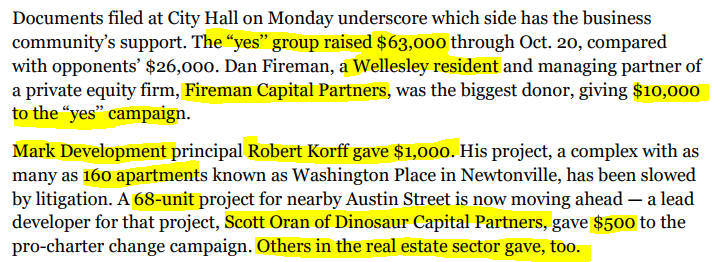
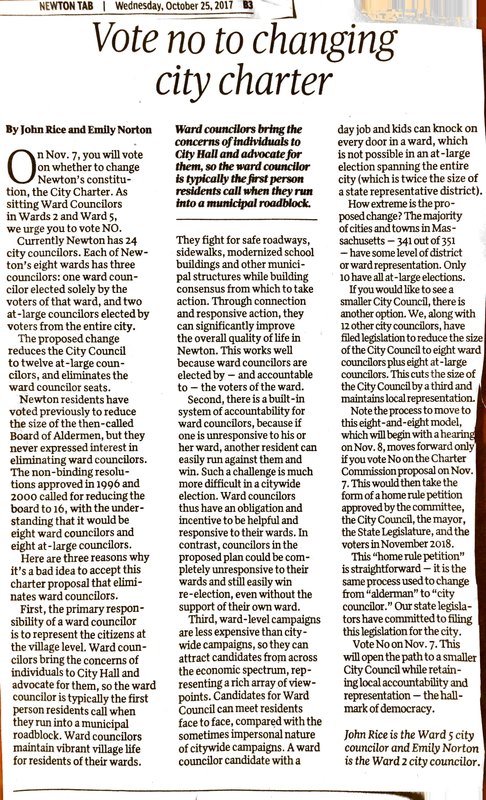
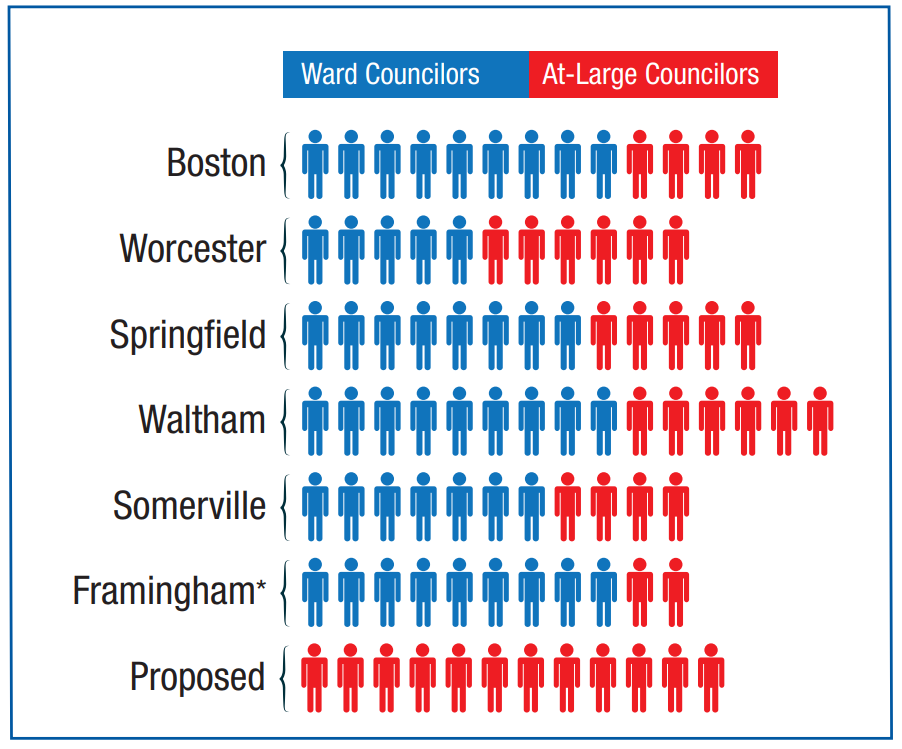

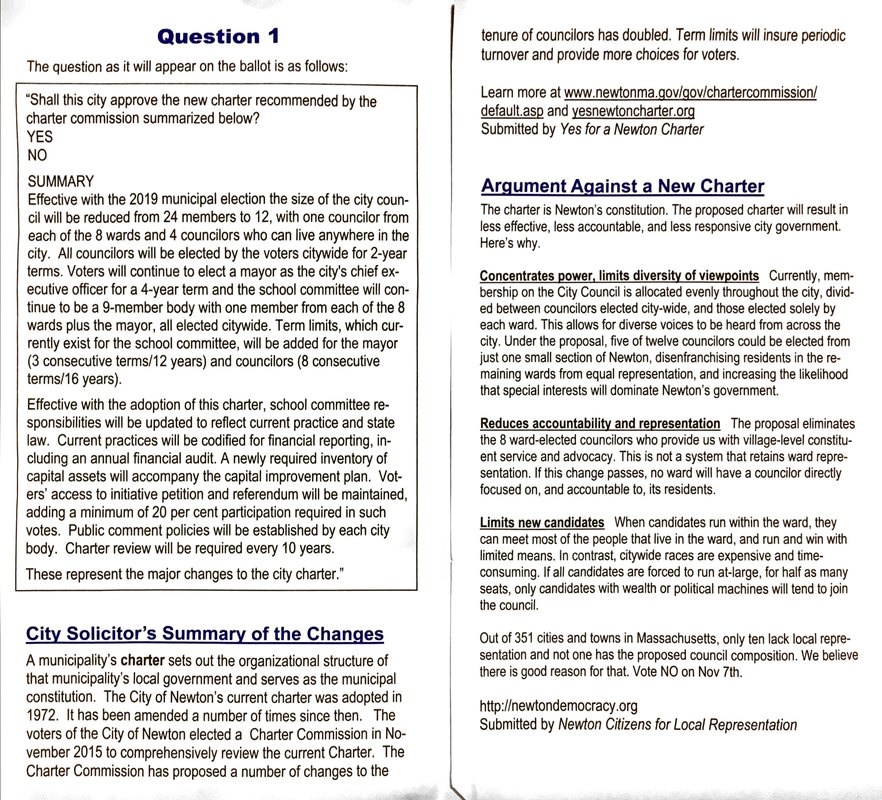
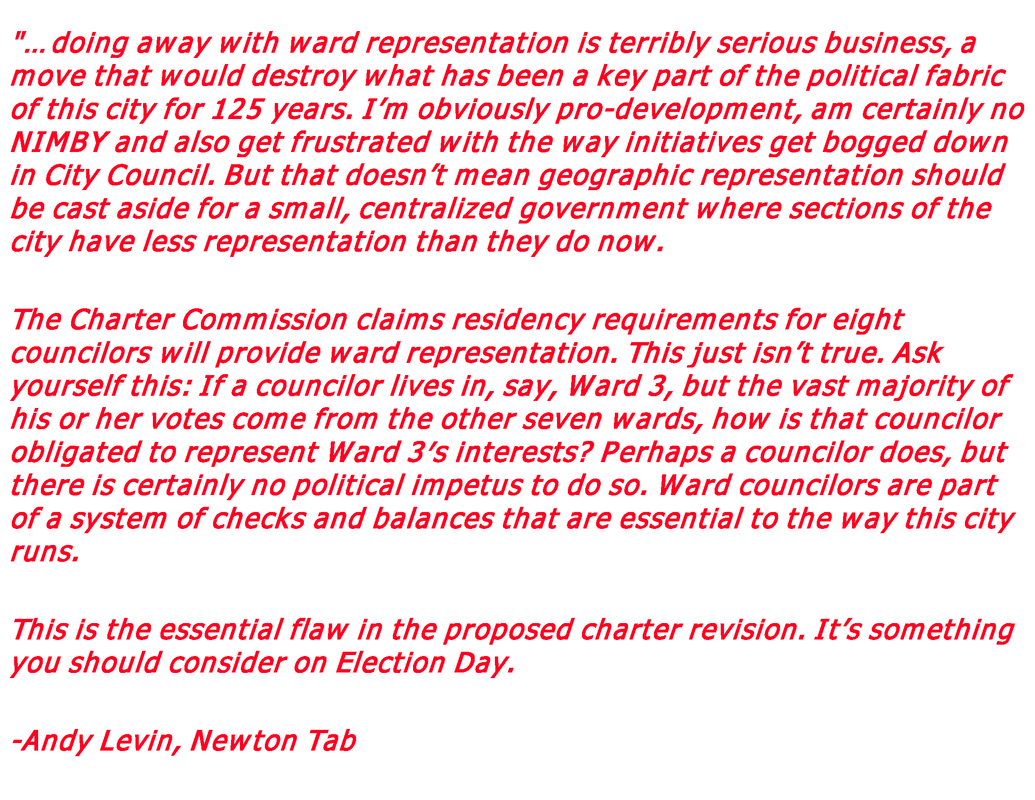
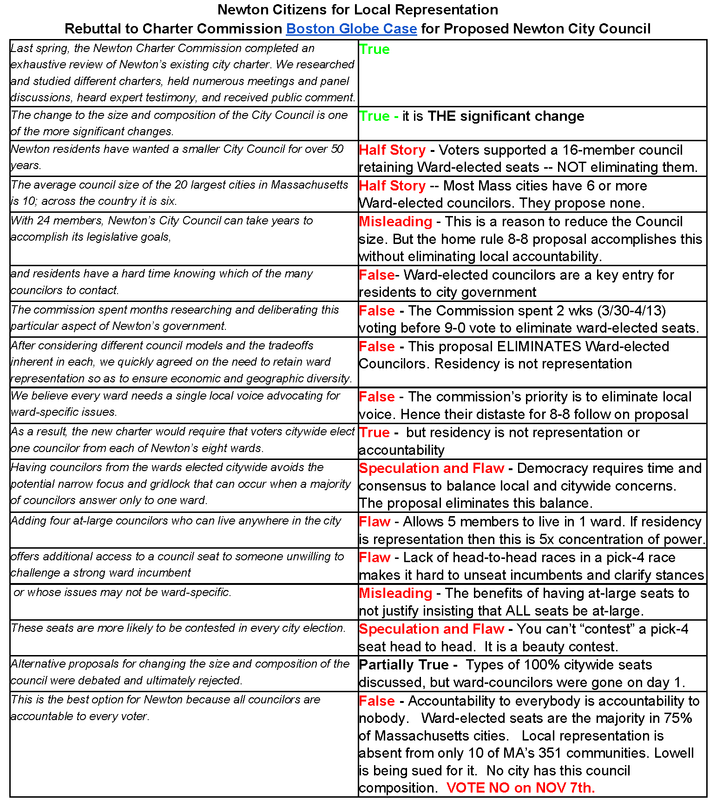
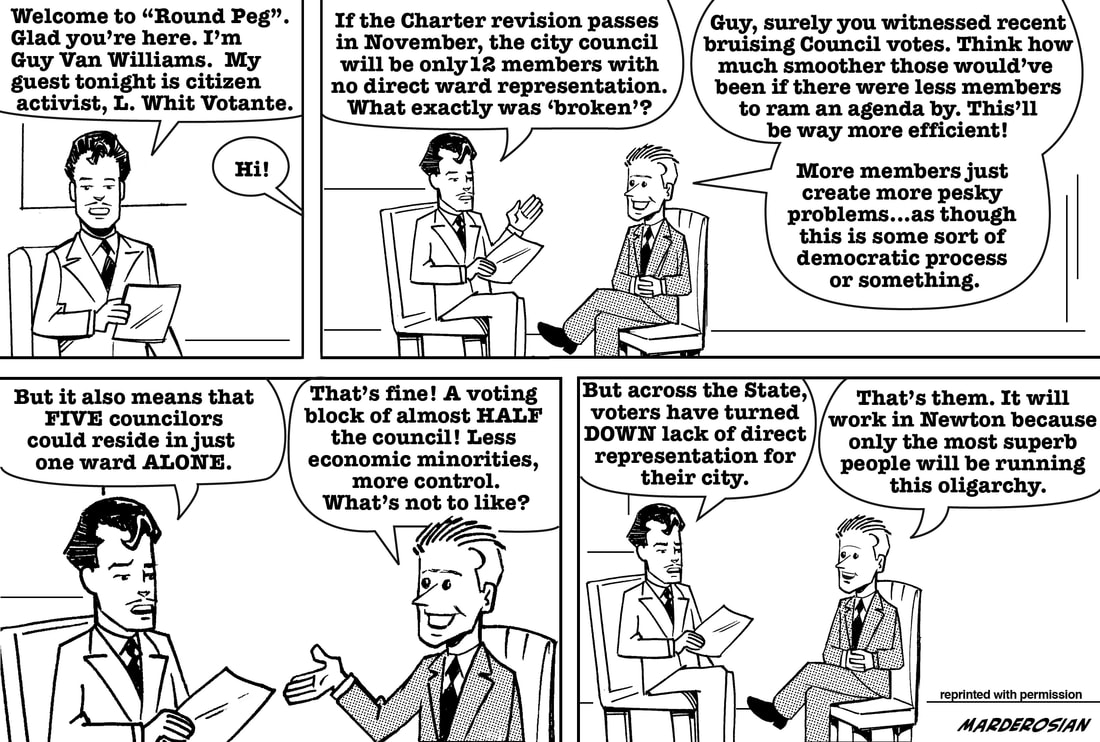
 RSS Feed
RSS Feed
